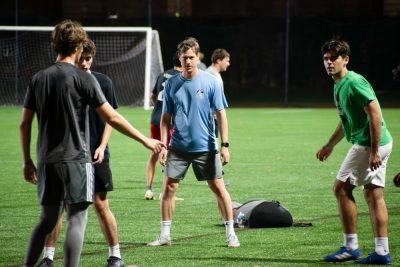The Boston University’s men’s club soccer team (8-1-1 NIRSA Region 1) are heading to nationals this season, which begs the question: Top of the region or top of the world?

The Terriers are 1st in their region, despite ranking 12th overall in points per game, with an average of 3.2. There are 27 players on the squad, representing multiple states and even multiple countries.
The team plays in the NIRSA Region 1 Club Soccer League as part of the Eastern Massachusetts division.
Club sports allow athletes to maintain a competitive healthy outlet, but in a different league and level, and not as competitive. For freshman center back David Gonzalez and junior midfielder Alexander Monteiro Leith, club sports have also served as a helpful transition to college.
As a transfer, Leith said the team felt like a community right away, while Gonzalez said meeting people with similar interests helped him get out of his shell.
Leith transferred from Endicott College, where he played Division III soccer. He said he was attracted to the philosophy of club soccer.
“There’s no pressure, really,” Leith said. “So that allows people to just be creative and connect and take risks on the field, which oftentimes makes for the best actual soccer.”
Leith has played soccer since he was four or five, and was taught by his uncle, who Leith said was a professional player for Cape Verde’s national team.
Gonzalez spent years playing soccer, but he also took to ballet and breakdancing prior to his college career, which he said has brought transferable skills to the field.
“It’s a big reason why I’ve been blessed with strong ankles,” Gonzalez said. “I mean, that’s literally all ballet. It’s flexibility, ankle strength, balance. You need all that in the field.”
Graduate and left back Henry Di grew up swimming and running track, but mostly remained focused on soccer.
“Overall, I was just surprised by how high of a level and how competitive it was to play for BU men’s club team,” said Di.
While all three teammates come from different backgrounds, all of them agreed on the team’s powerful chemistry, which is evident in the squad’s success.
“Because we had the connection of soccer, from there we had the friendship, the chemistry and from there, translates to other areas,” Di said.
A common misconception is that club soccer lacks a competitive attitude that professional collegiate teams possess.
“We all want to win, same thing as the NCAA sports,” Gonzalez said. “We play competitive. They play competitive.”
Leith said that part of what makes club sports just as engaging is the freedom his team plays with, which helps alleviate pressure and is beneficial for the team’s morale and consequent success.
While the team had a successful regular season, the players understand there is always room to improve. For Leith, that means staying consistent and staying healthy.
Coming back from an ankle injury, Leith hopes to play good minutes from this point forward.
For Gonzalez, improvement lies in maintaining a consistent pace of play.
“Sometimes, when we play teams that are less good, we slow down a little bit, and I think that hurts us because we have spent too much time on the ball,” Gonzalez said. “We make careless decisions, and we end up conceding easy goals that should never be happening.”
Di agreed with his teammate.
“If you don’t have that communication, one mistake leads to another,” Di said. “You win as a team, and you also lose as a team.”
The Terriers’ upcoming trip to nationals is the club program’s first, and will take place Nov. 21-23 in Round Rock, Texas.
“We’re like your average student,” Gonzalez said. “We go out there and we try to perform and I think people can connect with that.”



















































































































VTech Fan • Nov 13, 2024 at 7:30 pm
Virginia Tech club soccer on top
Cris • Nov 13, 2024 at 11:16 am
Nice job Ava!
BT • Nov 13, 2024 at 11:14 am
Great article Ava!!!